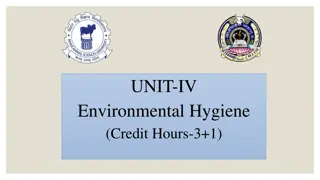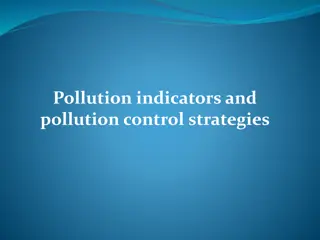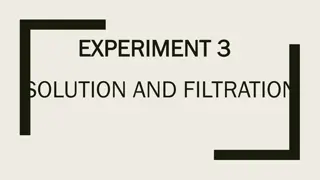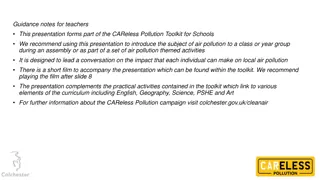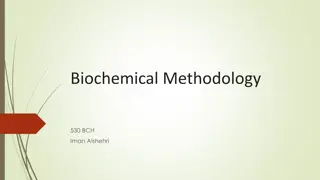Understanding Pollution and Purification in Greek Religion
The concept of pollution and purification played a crucial role in maintaining religious and social norms in ancient Greek society. Breaking boundaries or defying societal expectations could lead to pollution, necessitating purification rituals. Examples of actions that could cause pollution included bloodshed, improper burials, disrespecting sanctuaries, and failing to follow divine will. These practices reflect the belief in the importance of maintaining purity and cleanliness in connection with religious practices. The rituals surrounding purification were essential for restoring an individual's or a community's spiritual and social standing in the eyes of the gods and society.
Download Presentation

Please find below an Image/Link to download the presentation.
The content on the website is provided AS IS for your information and personal use only. It may not be sold, licensed, or shared on other websites without obtaining consent from the author. Download presentation by click this link. If you encounter any issues during the download, it is possible that the publisher has removed the file from their server.
E N D
Presentation Transcript
Miasma Bremmer Greek Religion p.5-6 An important consequence of overstepping or breaking existing cosmological, social, and political boundaries was the incurring of pollution. The vocabulary of pollution and purity together with its concomitant practices was most frequently used in Greek religion to indicate proper boundaries or categories not to be mixed The employment of this particular vocab with the corresponding rites of purification can, in one way, be seen as an important Greek way of dealing with maintaining religious and social norms and values in times when the legal process was still underdeveloped IG II21035.10 It is the ancestral custom that in no temple precinct should anyone either be born or die
MIASMA/POLLUTION Purity Cleanliness is next to godliness English Cf. Bendlin (2007) Divinity Divinity Normality Disgust/Pollution Pollution Bodily Fluids Sex Birth Death Contamination French
WHAT GETS YOU POLLUTED Being involved in bloodshed (and yet the gods love sacrifice cf Euripides Iphigenia among the Taurians 380-4). Sex Touching a new mother Touching a corpse Denying the right of burial (see Antigone) Disrespecting a sanctuary (Thuc 1.128.1-2) Not confirming to the law (cf. law on mourning from Gambreion 3rd c BC) Not following the will of the gods properly (Thuc 5.1 Athenians trying to cleanse Delos) And the list goes on .
BLOODSHED AND MURDER Sacred Law Salinas If a man [who has killed another man with his own hand] needs to be purified, having made a proclamation from wherever he wishes and whenever in the year he wishes, having made a declaration in whatever direction he wishes, let him be purified. On receiving him let he who receives him give water to wash with and a meal and salt to him and having sacrificed a piglet to Zeus let him go away from and let him be purified Sacred Law for Keos late C5BC When someone dies, when the person has been carried out, women are not to go to the house other than those who are polluted. The mother, the wife, the sisters and the daughters are polluted, but in addition to these not more than 5 women, the children of daughters and cousins, but no one else. The polluted men when they have washed their heads by pouring water are to be pure At the third day and at the annual commemoration those who perform it are to be pure, but not to go to a sanctuary, and their house is to be pure except while they come from the tomb
Orestes purified by Apollo at Delphi -Eumenides Painter 380-370BC
SEX GDI 1156 Olympia C6BC If he commits fornication in the sacred precinct, one shall make him expiate it by the sacrifice of an ox and by complete purification Sacred Law of Kos (350 BC RO 62) When they make libations let the priest choose one person as the slaughterer of the ox and let him proclaim that the slaughterer shall be pure from woman and man during the night (LSCG 151 = Kearns 5.3.2) Cult regulations of Athena Lindia, C3BC 41 days from defloration; 41 days from bereavement; 7 days from washing the corpse, 3 days from entering the house, 3 days from contact with childbirth, 11 days from giving birth, from a prostitute 30 days. One is never pure from illegal acts.
BIRTH Cult regulations of Athena Lindia, 3rd c: They must not bear arms and they must wear clean clothing, without headgear, being unshod or non-goatskin sandals, not wearing anything of goatskin, and with no knots in girdles 40 days from the miscarriage of a woman, dog or ass; 41 days from defloration; 41 days from bereavement; 7 days from washing the corpse, 3 days from entering the house, 3 days from contact with childbirth, 11 days from giving birth, from a prostitute 30 days. One is never pure from illegal acts. Asklepios cures 1. [Cleo] was pregnant for five years. After already five years of pregnancy she came as a suppliant to the [god] and went to sleep in the innermost sanctuary. As soon as she came out of it and was outside the sanctuary, she gave birth to a boy, who as soon as he was born washed himself from the fountain and walked about with his mother. After being granted this favour she wrote the following inscription on her dedication: `It is not the greatness of the tablet that deserves admiration, but the divinity, as Cleo was pregnant with child in her womb for five years, until she went to sleep (sc. in the sanctuary), and the divinity restored her to health.








